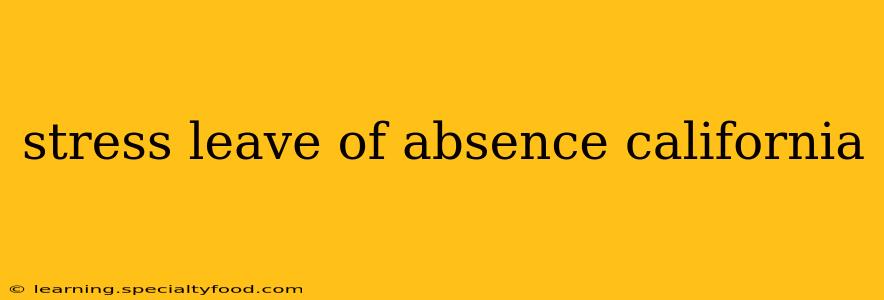Experiencing overwhelming stress can significantly impact your well-being and ability to perform your job. In California, employees have several options for taking time off to address stress-related issues, though there isn't a specific "stress leave" designation. This guide will clarify your rights and options under California law.
What are my options for taking time off due to stress in California?
California offers several avenues for employees needing time off due to stress, including:
-
Vacation Time: If your employer provides paid vacation time, you can use this for stress-related absences. This is the most straightforward option, provided you have accrued vacation time.
-
Sick Leave: California's Sick Leave law (California Labor Code § 233) mandates that employers provide a minimum amount of paid sick leave. You can use this leave to address health issues related to stress, including mental health conditions. The crucial aspect is that the leave is taken for a health condition that needs attention.
-
Disability Leave: If your stress leads to a disability that prevents you from performing your job, you might be eligible for disability leave under the California Fair Employment and Housing Act (FEHA) or the federal Americans with Disabilities Act (ADA). This would require documentation from a healthcare professional confirming the disability. This is particularly relevant for situations where stress leads to a diagnosable condition like anxiety or depression.
-
Family and Medical Leave Act (FMLA): If you've worked for your employer for at least 12 months and have accumulated 1250 hours, you might qualify for unpaid, job-protected leave under the FMLA. This leave can cover serious health conditions related to stress, but you'll need medical certification. Note that FMLA is a federal law, and state laws may offer additional protections.
How much time off am I entitled to for stress in California?
The amount of time off you're entitled to depends on the type of leave you take.
- Vacation Time: This varies depending on your employer's policy and your accumulated vacation days.
- Sick Leave: California law requires a minimum amount of paid sick leave, but employers may offer more. The amount can depend on the employer’s size and the length of your employment.
- Disability Leave: The duration of disability leave depends on the severity of your condition and your doctor's recommendations.
- FMLA: FMLA provides up to 12 weeks of unpaid, job-protected leave within a 12-month period.
Do I need a doctor's note for stress leave in California?
While not always legally required for all types of leave, providing medical documentation can strengthen your claim and facilitate the leave approval process, especially for sick leave or disability leave. This documentation would need to establish a connection between your stress and your inability to work. Always check your employer's specific policies.
Can my employer deny my request for stress leave?
Your employer cannot deny your request for leave if it falls under legally mandated provisions like sick leave or FMLA. However, they may require documentation from a healthcare professional to support your claim. Unlawful denial of leave could lead to legal action.
What if my stress is caused by my job?
If your stress is directly related to your workplace environment (e.g., harassment, hostile work environment), you may have additional legal recourse under California's FEHA. This law prohibits discrimination and harassment based on disability, including mental health conditions.
What should I do if my employer denies my request for leave?
If your employer denies your request for leave that you believe is legally justified, consult with an employment lawyer in California to discuss your options. They can advise you on your rights and the best course of action.
This information is for guidance only and should not be considered legal advice. Consult with a legal professional for advice tailored to your specific situation. Remember, prioritizing your mental health is crucial. Taking necessary time off to address stress is a step towards a healthier and more productive you.
